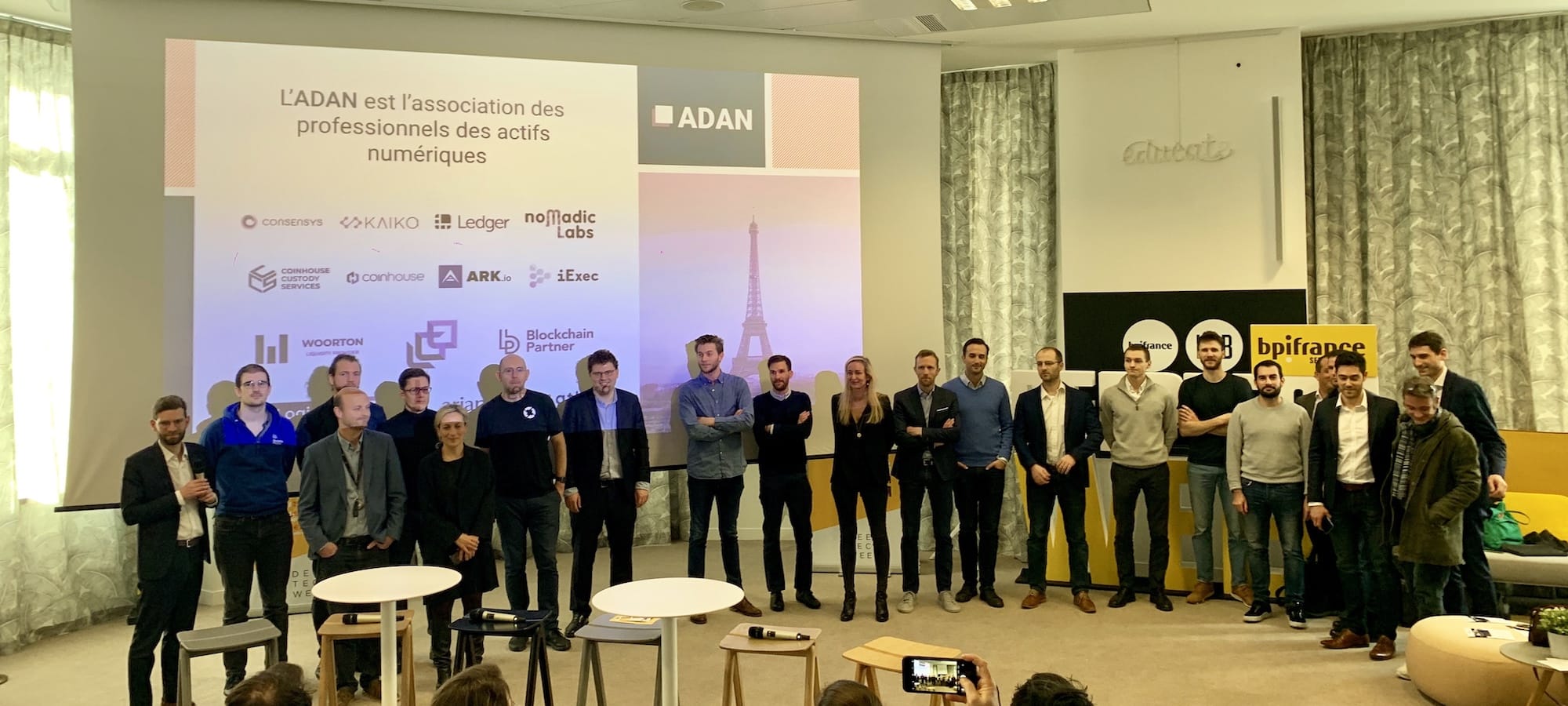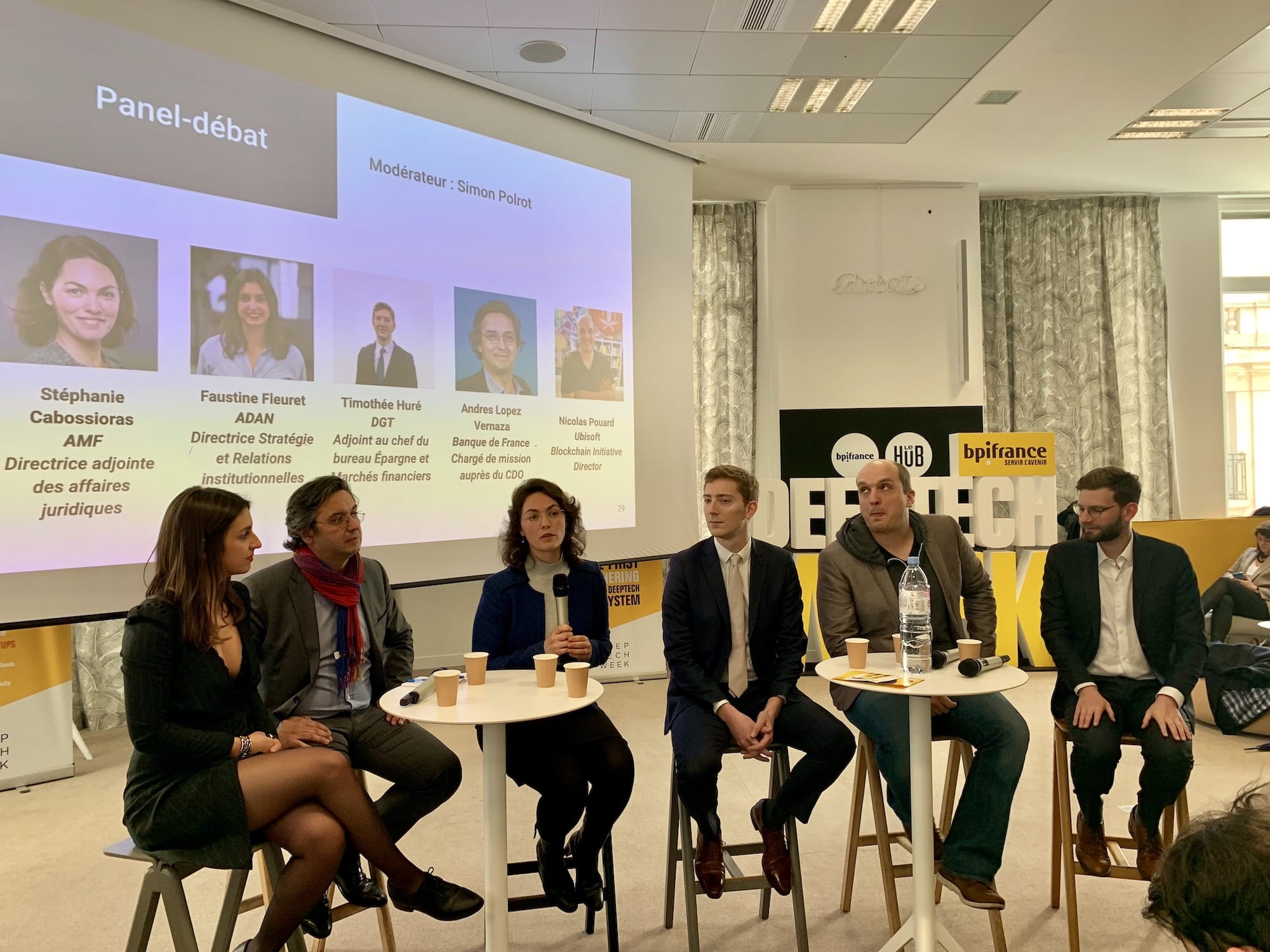Research
Launch of the ADAN: a lively exchange on the promising future of digital assets
The Association for the Development of Digital Assets (ADAN) officially celebrated its launch on Friday 6 March at a conference and cocktail party held at Bpifrance’s premises in Paris.

On the occasion of this event, ADAN, its members and its team are delighted to have been able to welcome players from the world of digital assets as well as those from traditional banks and financial markets. The Association would like to thank Stéphanie Cabossioras from the Autorité des marchés financiers (AMF), Timothée Huré from the Direction Générale du Trésor (DGT), Andrés Lopez Vernaza from the Banque de France and Nicolas Pouard from Ubisoft for their participation in the panel discussion, which members of the public followed with great interest. The Association is also grateful to Bpifrance for its warm welcome to its Hub.

Introductory presentation by Simon Polrot, President of ADAN
As part of a general introduction, Simon Polrot, President of ADAN, presented the vision of digital assets and the mission carried by the association. This was an opportunity to recall the great diversity of these assets and their use cases, from bitcoin to financial securities, but also to outline in a few lines a possible future for their development.
Report of the panel discussion
The Autorité des marchés financiers (AMF), the Banque de France, the Direction Générale du Trésor (DGT) and Ubisoft have unanimously welcomed the creation of ADAN. They share the Association’s vision of the ongoing and future transformation of digital assets and the traditional banking and financial system.
General remarks
“We are delighted to have players who are there to relay the messages, help us understand, and advance these great digital asset projects”
– Timothée Huré, Direction Générale du Trésor (DGT)
The AMF is convinced that the blockchain is a technology of the future and that it will give rise to many innovative uses, particularly in the financial world. The AMF wants to support the development of these new activities and promote the emergence of French champions of global stature. For several years now, the AMF has been working on two major levers to achieve this: regulation (user protection) and support for project sponsors.
DGT welcomes the ongoing structuring of the industry, encouraged very early on by the AMF and now gathered around ADAN. In order to meet challenges that it considers to be highly stimulating but very complex because they are far removed from the DGT’s base (dealing with non-fungible assets, decentralised structures, etc.), the expertise of the players is needed to help understand and move these projects forward.
According to Ubisoft, the video game industry is waiting for clear regulations to move forward comfortably on these issues.
The Banque de France has been very involved in these issues for years: it conducts experiments within its Lab and has deployed the first central bank blockchain at the global level. The blockchain and digital assets are closely watched for their relevance to the tasks carried out by the Banque de France: monetary strategy, financial stability and services to the economy.
Regulations
“Just as the French authorities have had the great intelligence to involve industry in their work from the very beginning of the regulatory debates, at the European level the players must be invited to participate in the construction of the Community framework. ” Faustine Fleuret, ADAN
The launch event of the ADAN is the occasion for the AMF to announce the publication the same day of its legal analysis on the application of financial regulations applicable to security tokens. This analysis follows on from the AMF consultation launched in September, which thanked stakeholders for their contributions. In reviewing all financial regulations, the AMF draws the following main conclusions:
- European regulations do not prevent the issuance of security tokens: no need for legislative change
- The registration of unlisted security tokens in investment funds is also possible, thanks to the Blockchain Ordinance, which allows the registration of unlisted securities in the blockchain.
- Regarding the exchange of security tokens. The MiFID 2 regime does not prevent the development of trading platforms for these tokens. Alongside the analysis note, the AMF also publishes its position on the use of bulletin boards, for security tokens as for other financial instruments. On the other hand, the CSDR Regulation poses a problem in its current state because it makes it impossible to settle and deliver these tokens.
The AMF is proposing the creation of a mechanism at European level for exemption from certain requirements réglementaires - précisées in the Authority’s analysis (notably CSDR requirements) - pour players in return for sufficient guarantees, aimed at removing these identified blockages. The objective is to let the projects develop in order to determine, with the necessary hindsight, the appropriate regulations to be put in place.
ADAN welcomes the creation of this Digital Lab as the optimal solution to create a proportionate and effective regulatory framework for digital asset-based activities. The basis of this experimentation nevertheless requires consideration to be given to the creation of a stable European corner.
Stable corners and central bank digital currencies
“The essence of digital central bank money is the purity of the stable corners! ” Andrés Lopez Vernaza, Banque de France
The Banque de France has published a number of working papers (including one on the day of the event) on stable corners and is actively reflecting on the subject, particularly concerning the impacts of these new “stable assets”: economic consequences, on monetary policy, on monetary sovereignty, etc. The Banque de France notes the increased maturity on the subjects of stable corners and digital central bank currencies (DCBMs), and perceives a better definition of useful use cases by and for the actors. In order to discuss this issue with industry, the Banque de France invites players to respond to its call for experimentation, which it will publish by the end of the month. At this stage, the Banque de France is focusing on the “wholesale MDBC” case.
Ubisoft is very interested in “private” retail stable corners. In the context of the video game industry, the user’s experience is central, and stable corners seem more accessible to them than MDBCs and crypto-currencies.
By associating tokens with objects (known as single digital assets or NFTs), the blockchain allows behaviours to be programmed and these tokens to be exchanged to create new liquidity. However, the widespread use of payments via cryptomoney seems limited: the intrinsic volatility of bitcoins, ERC 20, etc. makes them more difficult to access.
The need for stability is not only necessary for the gaming industry or banking interactions. The ideal for the DGT is to have securities settlement and delivery of financial securities only on the blockchain (to avoid duplicating infrastructures): it is therefore necessary to have an asset of stable value, but also to allow securities settlement beyond the French framework alone. However, the work on listed securities is a European project.
France had initially sent very negative signals following the announcement of the Libra project. The DGT recalls the rational sources of concern that can arise from the stable corners, particularly with regard to the monetary reserves of these tokens and the trade-offs used to stabilise exchange rates. The main aggravating factor is the mass of users, because the greater the mass of users, the greater the risks inherent in the Stablecoins: for example, the risk of money laundering and terrorist financing. However, recent work to adapt the regulatory requirements in this area has not taken into account the emergence of stable tokens of such a scope. However, the virtue of initiatives such as Libra is that they have highlighted the legitimate needs of industry and individuals (for easier and cheaper cross-border payments) and have relaunched the work of central banks to meet them.
European issues
“France is perceived as a pioneer country: we have serious projects, solid regulations and expert authorities. “Stéphanie Cabossioras, Financial Markets Authority (AMF)
ADAN recalls the importance of tackling, in France and at the European level, all the regulatory issues encountered by the digital asset industry. The European Commission’s ongoing consultation will be very structuring in order to anchor the lead and expertise acquired by French players (both private and public). Reflections on stablecoins must continue, and be deepened, particularly on incomplete aspects of the analyses carried out at this stage, such as the differentiated regulatory treatment according to the underlying stabilisation mechanism (whereas crypto-collateralised and algorithmic stablecoins have not been studied at all to date). Work on the regulation of digital assets in the fight against money laundering and terrorist financing will also be a long-term project at the European level, even if the urgency is greater in France in the context of the ongoing FATF evaluation and the prospect of legislation by the government by the end of the half-year. Finally, ADAN will closely monitor and support the idea of the AMF’s Digital Lab, with a view to the major work to be carried out at European Union level on the regulation of security tokens. It is to be hoped that, like the French authorities, the European authorities will work together with the digital asset industry to build a harmonized, solid, proportionate and effective European regulatory base.
The AMF invites stakeholders to take part in the European Commission’s consultation, which is very open and already knows the legitimacy of the French ecosystem in regulatory debates. France’s credibility in current and future discussions at European Union level must be established.
Ubisoft highlights other European issues, such as digital identity and the creation of digital values. In addition to regulation, we must not forget the other pillars of user adoption of digital assets.
Overcoming the obstacles to the development of digital assets in France
“One of the missions of ADAN is perhaps that next year there will be too many candidates who wish to take part in this panel! ” Simon Polrot, ADAN
“We have to try to project ourselves, to think about all that this technology, which multiplies the capacity for transactions, can have as an impact on human interactions. “Nicolas Pouard, Ubisoft
While regulatory uncertainties and obstacles have already been widely discussed, ADAN underlines the other levers that need to be activated in the coming years to overcome the main obstacles to the development of the French blockchain and digital assets sector: continued and sustained educational efforts towards certain players in the traditional ecosystem and the need to clean up the relationship between these two worlds, whose synergies are, on the contrary, very positive; a better matching of the training offer to the current and future needs of blockchain companies; the unblocking of investments and funding to support the development of the sector and its international ambition; and finally, the end of the current reluctance of the industry as a whole to express their vision of digital assets.
Video capture by Ethereum.fr.